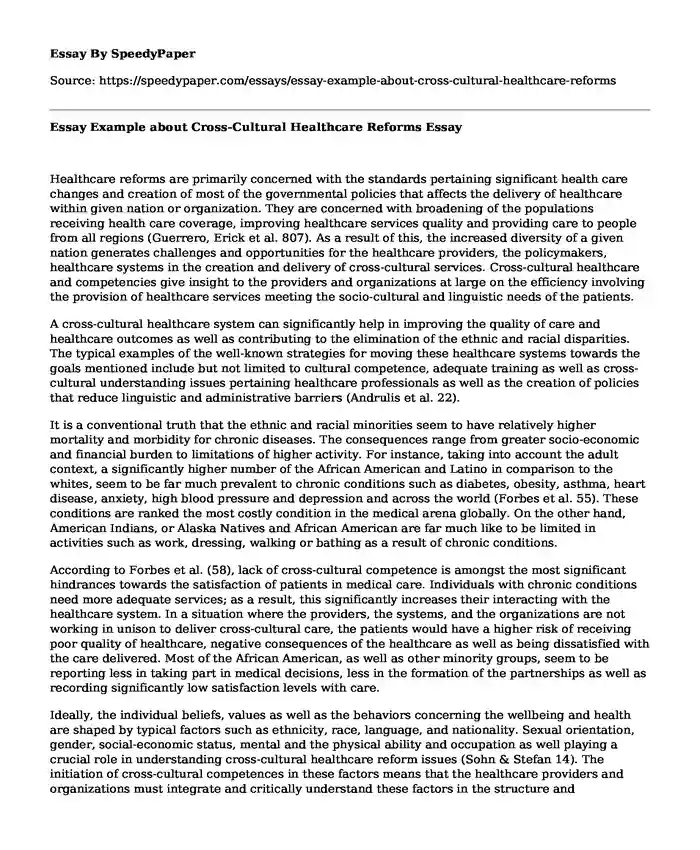
| Type of paper: | Term paper |
| Categories: | Healthcare policy Public health |
| Pages: | 3 |
| Wordcount: | 688 words |
Healthcare reforms are primarily concerned with the standards pertaining significant health care changes and creation of most of the governmental policies that affects the delivery of healthcare within given nation or organization. They are concerned with broadening of the populations receiving health care coverage, improving healthcare services quality and providing care to people from all regions (Guerrero, Erick et al. 807). As a result of this, the increased diversity of a given nation generates challenges and opportunities for the healthcare providers, the policymakers, healthcare systems in the creation and delivery of cross-cultural services. Cross-cultural healthcare and competencies give insight to the providers and organizations at large on the efficiency involving the provision of healthcare services meeting the socio-cultural and linguistic needs of the patients.
A cross-cultural healthcare system can significantly help in improving the quality of care and healthcare outcomes as well as contributing to the elimination of the ethnic and racial disparities. The typical examples of the well-known strategies for moving these healthcare systems towards the goals mentioned include but not limited to cultural competence, adequate training as well as cross-cultural understanding issues pertaining healthcare professionals as well as the creation of policies that reduce linguistic and administrative barriers (Andrulis et al. 22).
It is a conventional truth that the ethnic and racial minorities seem to have relatively higher mortality and morbidity for chronic diseases. The consequences range from greater socio-economic and financial burden to limitations of higher activity. For instance, taking into account the adult context, a significantly higher number of the African American and Latino in comparison to the whites, seem to be far much prevalent to chronic conditions such as diabetes, obesity, asthma, heart disease, anxiety, high blood pressure and depression and across the world (Forbes et al. 55). These conditions are ranked the most costly condition in the medical arena globally. On the other hand, American Indians, or Alaska Natives and African American are far much like to be limited in activities such as work, dressing, walking or bathing as a result of chronic conditions.
According to Forbes et al. (58), lack of cross-cultural competence is amongst the most significant hindrances towards the satisfaction of patients in medical care. Individuals with chronic conditions need more adequate services; as a result, this significantly increases their interacting with the healthcare system. In a situation where the providers, the systems, and the organizations are not working in unison to deliver cross-cultural care, the patients would have a higher risk of receiving poor quality of healthcare, negative consequences of the healthcare as well as being dissatisfied with the care delivered. Most of the African American, as well as other minority groups, seem to be reporting less in taking part in medical decisions, less in the formation of the partnerships as well as recording significantly low satisfaction levels with care.
Ideally, the individual beliefs, values as well as the behaviors concerning the wellbeing and health are shaped by typical factors such as ethnicity, race, language, and nationality. Sexual orientation, gender, social-economic status, mental and the physical ability and occupation as well playing a crucial role in understanding cross-cultural healthcare reform issues (Sohn & Stefan 14). The initiation of cross-cultural competences in these factors means that the healthcare providers and organizations must integrate and critically understand these factors in the structure and incorporating and embracing new health reform systems. The principal objective of cross-cultural healthcare is to ensure the provision of highest quality care of the entire patients without basing on their cultural background, race, and ethnicity, English literacy or efficiency amongst other cross-cutting aspects (Sohn & Stefan 18).
Work Cited
Andrulis, Dennis P., et al. "Safety-Net Hospital Systems Transformation in the Era of Health Care Reform." Austin: Texas Health Institute (2015).
Forbes, David E., et al. "Cross-Cultural Healthcare Communication System." Ontology Engineering Applications in Healthcare and Workforce Management Systems. Springer, Cham, 2018. 53-60.
Guerrero, Erick G., et al. "Disparities in Latino substance use, service use, and treatment: implications for culturally and evidence-based interventions under health care reform." Drug & Alcohol Dependence 133.3 (2013): 805-813.
Sohn, Heeju, and Stefan Timmermans. "Social Effects of Health Care Reform: Medicaid Expansion under the Affordable Care Act and changes in Volunteering." Socius 3 (2017): 2378023117700903.
Cite this page
Essay Example about Cross-Cultural Healthcare Reforms. (2022, May 18). Retrieved from https://speedypaper.net/essays/essay-example-about-cross-cultural-healthcare-reforms
Request Removal
If you are the original author of this essay and no longer wish to have it published on the SpeedyPaper website, please click below to request its removal:
- Free Essay on Professional Education in Educational Organizations and in the Corporate World
- Science and Religion Essay Sample
- Management Essay Sample on Shared Vision and Organizational Culture
- Why Odysseus Described As One Who 'Veered From His Path' - Literary Essay Sample
- Free Essay Sample on the Safety Issues in Nursing Practice
- L.A. Confidential - Movie Review Essay Example
- Law Essay Sample on CARDWARE's Defenses
Popular categories




